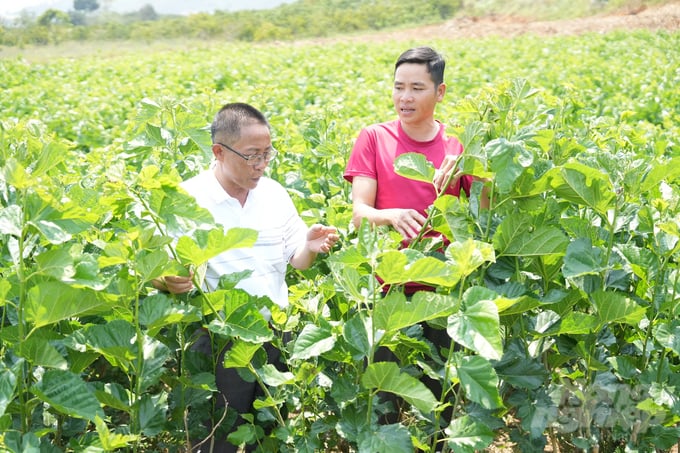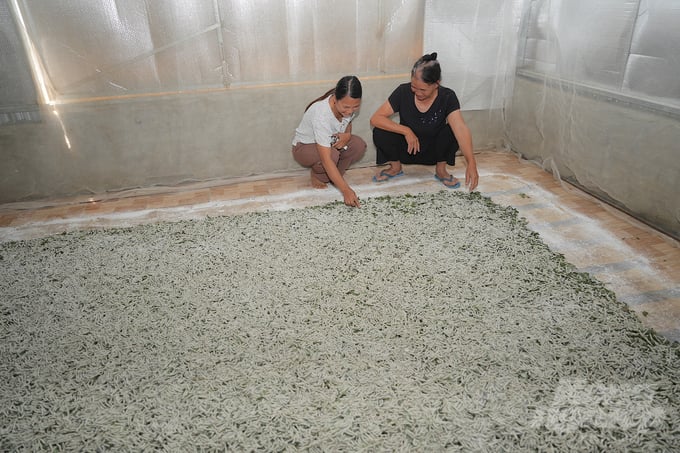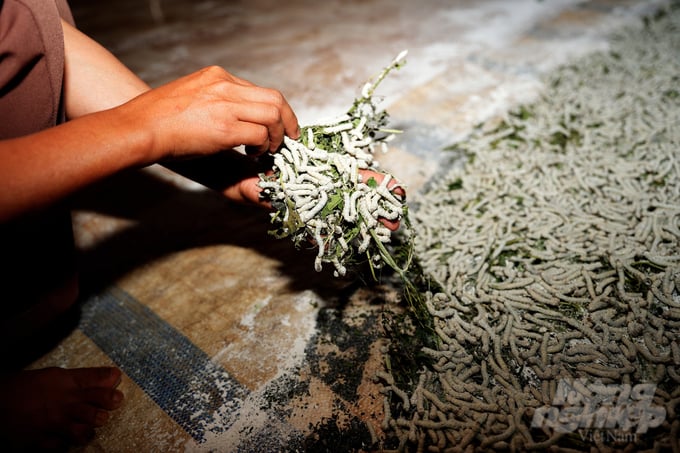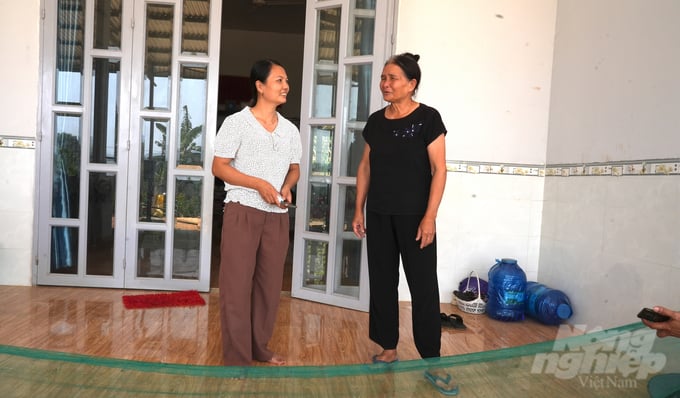June 21, 2025 | 01:04 GMT +7
June 21, 2025 | 01:04 GMT +7
Hotline: 0913.378.918
June 21, 2025 | 01:04 GMT +7
Hotline: 0913.378.918

Chairman of Dak Nong Farmer’s Union Ho Gam, next to the mulberry field of Luc Van Huy (right). Photo: Hong Thuy.
Coming back to Quang Hoa commune (Dak Giong district, Dak Nong province) that day, we saw the once full of rice fields turned to a green land of mulberries. Ho Gam, Chairman of Dak Nong Farmer’s Union, said, “In recent years, thanks to the silk factory in operation, many households have given up rice to sericulture. The factory provided silkworm seeds and offered underwriting contracts at stable prices. Compared to rice cultivation, growing mulberry and raising silkworms gives many times higher income”.
Luc Van Bo, 67 years old, was a farmer from Tay ethnic group in hamlet 8, Quang Hoa commune. The family has been here for more than 20 years, but only has 2 sao of farmland (Vietnamese measurement, 1 sao equals 500 m2). It is a big family, so 2 sao of rice is not enough to eat. Doing 2 crops a year only yields about 10 bags of fresh rice (roughly 1 ton), selling for VND 5 million. In recent years, Le Van Huy (Bo's son) has switched to sericulture, earning 10 times more money than rice, so life is much better now.
Taking us to the mulberry garden behind the house, Huy said, “ Ever since I switched to raising silkworms, my economic conditions have improved so much that I can marry my wife. I don't have my own house yet, but I'll probably build a new one soon. I just harvested 75 kg of cocoons and delivered them to the company, selling for VND 200,000/kg. I’m going to raise a new batch of silkworms in a few days."
According to Huy, 2 sao of mulberry is enough to raise 1 box of silkworm eggs worth VND 1.1 million. On average, each month the family raises 2 batches of silkworms. A box of silkworm eggs results in more than 70 kg of cocoons, and considering the purchase price of businesses currently from VND 200,000 to 210,000 per kg, each month he earns VND 20 - 30 million excluding expenses.

Lo Thi Y (right) and Nguyen Thi Ngoan, Chairman of the Farmer’s Union of Quang Hoa commune, next to the cage of 4-day-old silkworms. Photo: Hong Thuy.
Leaving Huy's house, we followed Nguyen Thi Ngoan, Chairman of the Farmer’s Union of Quang Hoa commune, to visit the model of silkworm rearing on the house floor of another Tay family in hamlet 6 (Quang Hoa commune). Lo Thi Y, 65 years old, owner of the new and spacious house, said that it was recently rebuilt after several years of growing mulberry trees and raising silkworms.
When asked about the difference between raising silkworms on the house floor and raising silkworms on nong (a type of Vietnamese traditional tool made of bamboo), she said, “Definitely better. Raising silkworms on nong takes a lot of effort. Every day you have to lift it up and down to feed the silkworms and clean it continuously. Silkworms are susceptible to diseases because of the heat from the silkworm excrement under nong so they often get sick, which means low quality.
“Raising silkworms on cement floors is much easier. Silkworms from 4 days old are raised on nong for 2-3 days, then we move them directly to the cement floor. Instead of picking up mulberry leaves one at a time, we can spread them directly or cut off an entire branch and place it on the floor. Raising silkworms on cement floors is more airy and spacious. The silkworms are not exposed to heat like raising on nong, so they are less likely to get sick”.

People in Quang Hoa commune (Dak Glong district) are raising silkworms under cement floors. This farming method is very convenient. Silkworms grow well and rarely get sick. Photo: Hong Thuy.
Y believes that raising silkworms is much better than farming rice. “Raising silkworms makes more money and makes it faster. It is no exaggeration to say that the silkworm builds this house. And it’s not even that hard. At first, there were officials coming to the hamlet and showing us how to raise silkworms. It only took me a few times to remember the whole process. But the important thing is that you have to be diligent and regularly maintain a clean environment. As for mulberry leaves, they must not be contaminated with chemicals, or else the silkworm will get sick easily.”

Thanks to practicing sericulture, the economy of many families is getting better and better. Photo: Hong Thuy.
“The soil and climate of Dak Glong are fairly suitable for mulberry trees to grow. The process of taking care of mulberry trees is now applied properly, and the seedlings are provided by the agricultural sector, so basically there is no problem. One thing to add is that the silkworm rearing process is now simpler than before thanks to standard breeds and modern technical guidance, so most sericulture models are highly effective. There are businesses that underwrite all silkworm cocoons at a stable price, people can thus produce with ease,” said Ho Gam, Chairman of Dak Nong Farmer’s Union.
Translated by Samuel Pham
/2025/06/17/3942-2-143243_548.jpg)
(VAN) Recently, in Sweden, the Secretary of the Binh Dinh Provincial Party Committee presented the Investment Registration Certificate for the 'Polyester Fabric Recycling Complex' project to SYRE Impact-AB Company.
/2025/06/12/3721-2-202745_83.jpg)
(VAN) TH made an impression at Seoul Food 2025 with its line of natural beverages, paving the way for Vietnamese food products to enter the South Korean market.

(VAN) Soc Trang's success in rice exports stems from a strategy of developing fragrant and specialty rice cultivation areas and standardizing production toward low-emission practices.
/2025/06/11/1311-5-120811_839.jpg)
(VAN) The pig farming industry is facing the challenge of comprehensive restructuring to meet requirements for quality, safety, traceability, and market expansion both domestically and for export.

(VAN) Vietnam considers participating in ALGROALBA in order to expand agricultural production, coordinate the assessment and effective exploitation potential land.
/2025/06/05/5314-1-184727_407.jpg)
(VAN) From seemingly worthless fish scales and skin, enzymes and lactic ferments can transform by-products into peptides, opening a sustainable, effective business direction and elevating Vietnamese seafood.

(VAN) TTC AgriS and IFC signed a strategic partnership to develop a sustainable agricultural value chain, aiming to achieve the Net Zero target by 2035.